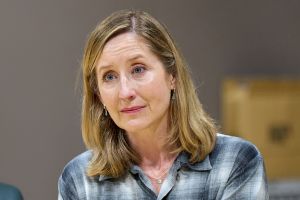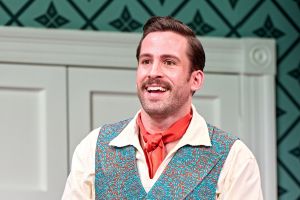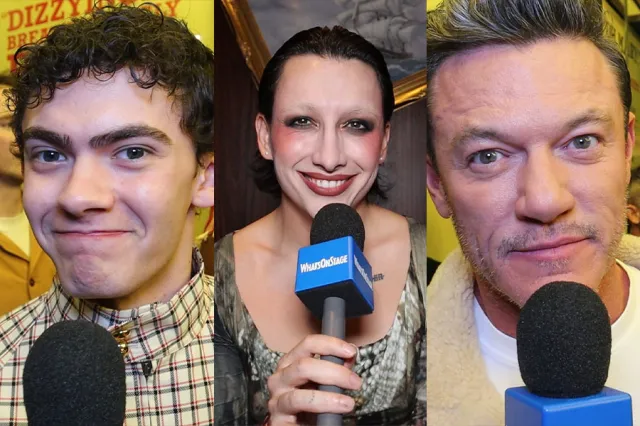20 Questions With…Adrian Lukis
Actor Adrian Lukis, now playing CK Dexter Haven for seven weeks in The Philadelphia Story at the Old Vic, talks about filling Kevin Spacey’s shoes, reuniting with Jennifer Ehle & how much TV fuels his theatre work.
Television viewers may know actor Adrian Lukis as the dashing young soldier and philanderer, George Wickham, in the BBC TV adaptation of Pride and Prejudice, or as Dr Shearer in Carlton’s Peak Practice, but he insists his first love is theatre.
His stage credits have included the title role in Macbeth, Arms and the Man, Something Wicked This Way Comes; As You Like It, All’s Well That Ends Well, Misha’s Party and School of Night for the Royal Shakespeare Company; The Front Page and Dead Funny at Chichester Festival Theatre; The Relapse and Sleep With Me at the National; and Dinner in the West End.
Lukis’ other screen credits include Midsomer Murders, Judge John Deed, Spooks, Foyle’s War, After the War, Prime Suspect, The Hunt, Back Home and Absolute Power on television; and The Trench, Me Without You, Seven Seconds and Young Blade on film.
Lukis has now returned to the stage at the Old Vic, where he starred last year in the UK premiere of Maria Goos’ Cloaca, the first production in Kevin Spacey’s inaugural season as the theatre’s artistic director. He’s now playing CK Dexter Haven in The Philadelphia Story, taking over for Spacey, who directed him in the Goos play and is now away for seven weeks filming Superman Returns, in which he plays Lex Luthor.
The Philadelphia Story reunites Lukis with Jennifer Ehle, with whom he co-starred in Pride and Prejudice. Ehle plays spoilt heiress Tracy Lord, ex-wife to CK Dexter Haven.
Date & place of birth
I was born in Birmingham on 28 March 1957. My family then moved to Australia, where I was raised in Adelaide until the age of nine; then we came back to England, and I was packed off to a prep school in Devon.
Lives now in…
I’ve lived in Brockley in south-east London for about 13 years.
Training
I went to University of Hull to read drama. We had Anthony Minghella as one of our teachers, and he led a separate playwriting course that myself and another actor did. Then I went abroad for nearly three years. I went back to Australia and ended up coming back through south-east Asia, in the early Eighties. Then I went to Drama Studio in Ealing for one year to do a postgraduate course, because I didn’t want to spend another three years training.
First big break
I think there have been a series of half breaks. I suppose Pride and Prejudice did me some good. To me, it’s all building blocks in this business. A series I did straight out of drama school, After the War, wasn’t seen by anybody as they shoved it out in the summer on a Friday night when everyone was away, but those who saw it loved it. It was a follow-up to Frederic Raphael’s Glittering Prizes; a sprawling ten-part look at England from the 1940s to the late 1960s. My character had to grow from 17 to 40. It was a very, very interesting piece of work. Since then, it’s really been a case of putting brick by brick in place, in terms of television profile, to enable me to do decent theatre – which is all I’ve ever wanted to do. I did Peak Practice for two-and-a-half seasons. That was probably something I needed to do, to cement my credits with the TV executives, so they know who you are.
Career highlights to date
I have to say the last thing I did was the most enjoyable, partly thanks to being old enough to have enough confidence in myself to do the job without so much fear – though there’s always an element of it. Fear can grab you more than the enjoyment and excitement. But with Cloaca, at the Old Vic with Kevin Spacey directing, it was a highly prestigious job, a sexy job, and I was utterly thrilled to get it. It was fantastic, and we had a really good time on it. The reviews were not very good, but the response we got from the public completely contradicted them in terms of people being moved by the play. It was also an extremely nice cast and we got on very well together. And for me to play a manic-depressive coke addict who had been disbarred from the law was an amazing opportunity.
Favourite productions you’ve ever worked on
Something Wicked This Way Comes an adaptation of the Ray Bradbury novel, was the very first play I did – that was terrific. We did it at Nottingham Playhouse and then our assistant director took over running York Theatre Royal, and our production was brought into the main house there. I’ve enjoyed a lot of the productions I’ve worked on for different reasons. At the National, I enjoyed doing The Relapse. It was a laugh and great fun to watch Alex Jennings. And, also at the National, Sleep with Me, in which I played a faux-cockney TV producer who was a real ass. It was great fun. At Chichester, I did The Front Page and Dead Funny. It was great to go from playing a madcap American comedy to a cold husband in Terry Johnson’s British play.
Favourite co-stars
Abigail McKern was lovely in Dead Funny, playing my wife; Abigail Thaw in Macbeth at Salisbury was really lovely; Jennifer Ehle who I’m now doing The Philadelphia Story with was in Pride and Prejudice, of course, and we got on very well then, so it’s lovely to be reunited with her; the boys in Cloaca; and dear Paul Kaye in Dinner – he’s a mad, mad boy!
Favourite directors
I’ve enjoyed working with Kevin Spacey and Loveday Ingram a great deal. And I very much liked working with Peter Hall, I like his clarity. He knew exactly what he wanted, and came in with a structure and way of dealing with Shakespeare that I liked very much. On television, I have enjoyed working with John Madden on Prime Suspect and After the War.
Favourite playwrights
Shakespeare is number one – he takes you to places that other poets don’t reach. I did Macbeth at Salisbury and there’s something about those words that you can’t cheat; you can’t mumble your way through it and hope for the best. You have to rise to the occasion that the character’s torment demands. It was a fantastic opportunity and a great antidote to the pallid crap you have to do on television a lot of the time! I also like Ibsen. I don’t know all of his work, but what I know I like. And there’s Chekhov, obviously. I was trying to avoid saying him, but he is a favourite. Of contemporary playwrights, I enjoy Neil LaBute. I’ve not seen the two most recent ones, but Bash was absolutely amazing.
What roles would you most like to play still?
I’d love to play Hjalmir in Ibsen’s The Wild Duck. I’m always interested in the way people disguise themselves – I like to see the mask and what lies underneath. People spend their time trying to be the sexiest, funniest, most attractive person in world, but their personality lets them down. The gulf between those two is what produces great drama in the theatre, though in life it produces anxiety! Hjalmir is living a whole suitcase of lies. Kevin Spacey is about to do Richard II, and of all the Shakespeares, having done Macbeth, I’d love to play that. It’s a wonderful character for an actor to try to come to terms with.
What’s the last thing you saw on stage that had a big impact on you?
I saw the rock group Athlete play at the Brixton Academy the other week – that was amazing. I see quite a lot of music. I saw a great singer, Mary Flowers, at the Borderline, and John Martin at Croydon. A bad film can be edited around – they can always put in another explosion. The trouble with theatre is that, if you see a show and you realise it’s no good in the first ten minutes, you’re really stuck! There’s nowhere to run, nowhere to hide. But I’m going to see The Postman Always Rings Twice because my great friend Andrew Rattenbury has adapted it and I’m very much looking forward to it.
What would you advise the government to secure the future of British theatre?
Somehow, if people grow up without any exposure to theatre at all, which great swathes of the population do, it’s very hard to get them in to see plays when they’re older. Theatre tries to chip away at truths, and perhaps our regimented curriculum doesn’t allow for it. I’m all for art in general having a much higher profile in our lives, but I suspect that we’re a nation who aren’t terribly interested in it. It passes a vast majority by. So I would like to see more arts emphasis in schools.
If you could swap places with one person (living or dead) for a day, who would it be?
I think Byron, because he was probably in somebody’s arms on most days, and he lived pretty well. I’d like to be Bryon during the period that he went to Venice – that would have been an interesting time.
Favourite holiday destinations
Australia, because I spent some time growing up there. Thailand – I spent about three months there the first time I went and I’ve been back several times, and I just like it very much. We got the furniture in our house from there. And Greece – I’ve been to Crete three times and I’ve always had very nice holidays there.
Favourite books
Quincunx by Charles Palliser is a long sprawling Victorian novel that is a really interesting piece of work. Piers Paul Reid is an extraordinary novelist. His Polonaise is a tremendous book that affected me very much when I read it.
Favourite after-show haunts
I’m a member of Two Brydges club off St Martin’s Lane, and recently I’ve come to appreciate the finer points of the Pit Bar at the Old Vic. That stays open late after the show!
If you hadn’t become an actor, what would you have done professionally?
I’d have probably tried to be a writer.
Why did you want to accept your part in The Philadelphia Story?
Funnily enough, I enquired into getting the rights to this play about four or five years ago. I’d seen the film on television and it reminded me what a good piece it is and how funny it is. I phoned my agent, who chortled and said, “we’ll never get the rights, (West End producer) Duncan Weldon has had them for years”. So it’s fairly fortuitous that this has happened – though to be honest, I think they were trying to get some American star in, but that’s the way this business works! It would have been very vain of me to be upset by that. But I’d seen the production and really enjoyed it. I like the play, obviously, and it’s really, really lovely to meet up with Jennifer again after all these years. She’s a really good person and very straightforward. Then this offer came through, and I’m very happy to do it.
What’s the particular challenge of appearing in a classic American comedy like this?
I’ve had to go for dialect sessions – not only to get the accent right, but also to find out about an old-fashioned American accent. Then there’s the challenge of filling Kevin’s shoes. I very consciously limited the number of times I saw it with him. I didn’t want to pick up his inflections, or repeat exactly what he did – I want to try to make it my own. Normally, of course, you also get the opportunity to meet all the other actors on day one of rehearsals and you all grow together. What’s been especially challenging this time is coming into a company who have all rehearsed and know their parts already and are relaxed into it. So I’m coming in with a certain amount of pressure on, but that’s okay.
What’s your favourite line from The Philadelphia Story?
I like when CK meets Kitteridge and says, “What’s the matter? You don’t look as well as when I last saw you!” It’s very light and he’s very witty.
What are your plans for the future?
I’m doing a tour of a play called Marrying the Mistress, which is an adaptation of a novel by Joanna Trollope. It’s a really good read and a very true account of a marital breakdown, when an older man falls in love with a younger woman and leaves his wife of 40 years as a result. My character is one of the sons, Simon, who is totally destroyed. He’s so angry at his father’s betrayal of his mother that he can’t forgive him. We start touring in September.
– Adrian Lukis was speaking to Mark Shenton
Lukis continues playing CK Dexter Haven until 6 August 2005, after which Kevin Spacey returns to the role. The Philadelphia Story finishes its season at the Old Vic on 3 September 2005.












